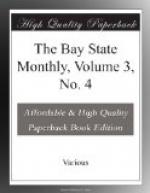In general interest this book is second to no other in the series of American Statesmen, so far published. The story opens well and does not diminish in interest to the end. The author, although now a St. Louis man, is himself from the old Adams stock, and has amply shown his capacity to prepare a concise and permanently valuable life of the sturdy American patriot and town-meeting man, Samuel Adams.
[Footnote 7: Samuel Adams. By James K. Hosmer. American Statesman Series. Boston: Houghton, Mifflin & Co. Price $1.25.]
* * * * *
The only fault which we have to find with Mr. Drake’s book[8] is, that he has not done himself justice in his title. The title which he has chosen is expressive neither of the size nor of the contents of his work. We read at least one hundred pages before we find a New England legend, and the only account of the folklore that we have been able to find is in the author’s introduction covering about six pages. Properly described, the work deals with New England history, of the most romantic character occasionally interspersed with a great deal of very tedious moralizing,—a blemish of style which Mr. Drake seems quite unable to avoid. The book, despite many features which annoy, is valuable, and ought well to repay publication. To the young especially it ought to prove interesting, since it makes plain to them many familiar tales of early childhood. The publishers, as usual, have done their level best to make it a very beautiful book, and have of course succeeded.
The second volume of the Life and Times of the Tylers[9] concludes the work. It is the volume which is the more important and will prove the more interesting to readers in general. It comprises the events and incidents of the public life of John Tyler,—from his induction into the Presidency in 1841 to his death while a member of the Confederate Congress of 1862. It must be remembered that these volumes are edited by a member of the Tyler family; a fact, which leads us to say that an impartial history of President Tyler’s administration of the pertinent matters which preceded it, and of the reflections upon its policy, cannot be naturally expected from a person interested, or from an actor in the politics of that period.
By the operation of the Constitution alone, Tyler became President. At that time, he was not considered by his party, and, after he had obtained the office by the death of General Harrison, he straightway placed himself in direct opposition to the party which had nominated and elected him Vice President. The son, who is the author or editor of these volumes, appears to be forgetful of this fact; for on no other ground can we account for the bias which he exhibits from the first page to the last. His duty, he thinks, is to defend his father’s administration, and this idea leads him into trouble at the very beginning. He says: “The Whig party of 1840 had nothing




